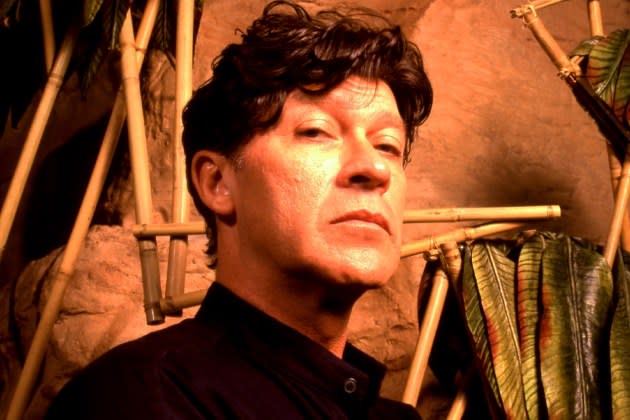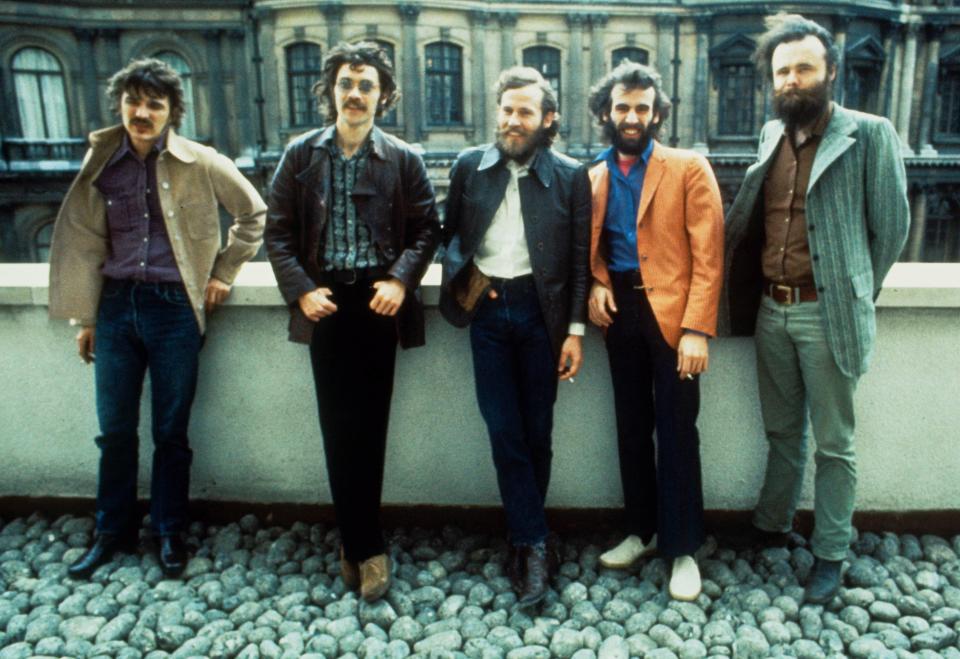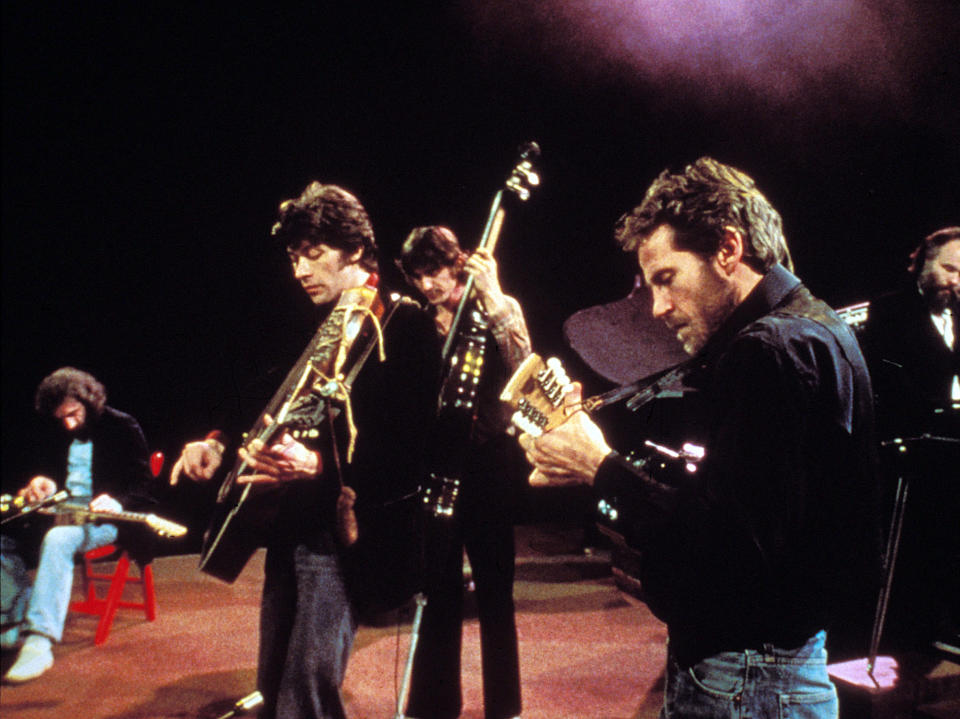Robbie Robertson Dies: The Band’s Founding Guitarist Was 80

Robbie Robertson, the brilliant founding guitarist of The Band who also wrote many of its most famous songs and whose farewell show with the group was memorialized in Martin Scorsese’s landmark documentary The Last Waltz, died today in Los Angeles after a long illness. He was 80.
His longtime manager Jared Levine announced the news via a statement from the family.
More from Deadline
Hollywood & Media Deaths In 2023: Photo Gallery & Obituaries
Bob Dylan Speaks On Death Of Robbie Robertson, His "Lifelong Friend"
Robertson wrote and played on the Rock and Roll Hall of Fame group’s classics including “The Weight,” “Up on Cripple Creek” and “The Night They Drove Old Dixie Down,” the latter of which was a Top 5 pop hit for Joan Baez in 1971.
A five-time Grammy nominee, Robertson got his break at age 16 with Ronnie Hawkins’ The Hawks, which eventually would feature many of his Band mates. He was Bob Dylan’s guitarist on the notorious mid-’60s “Going Electric” tours and, as leader of The Band, collaborated on groundbreaking album The Basement Tapes, helping to invent the Americana genre.
RELATED: Ronnie Hawkins Dies: ‘Father Of Canadian Rock ‘N’ Roll’ Was 87

The Band broke out with its 1968 debut album Music from Big Pink, which made the U.S. Top 30, went gold and featured such classic tracks as “The Weight” and the Dylan cover “I Shall Be Released.”
In 1969, The Band played at Woodstock and became the first North American rock group to appear on the cover of Time magazine.
Later that year, the group — which also featured fellow Canadians Garth Hudson, Rick Danko and Richard Manuel and American drummer Levon Helm — released its sophomore album The Band in 1969, which included its biggest pop single, “Up on Cripple Creek,” along with the Civil War-set folk tale “The Night They Drove Old Dixie Down.” The disc was its first Top 10 album, reaching No. 9 on the Billboard 200, and remains its only million-seller without Dylan.
The Band went on to release several other albums through the 1970s. Stage Fright (1970) reached No. 5 and featured the title track and “The Shape I’m In.” Cahoots (1971, No. 21) had “Life Is a Carnival,” and the Top 10 double live set Rock of Ages (1972) followed.
Its other albums include Moondog Matinee (1973), Northern Lights-Southern Cross (1975) and Islands (1977). Along with 1975’s The Basement Tapes, The Band also released a pair of Top 10 albums with Dylan the year before: Planet Waves and Before the Flood. The soundtrack to The Last Waltz — which was recorded in November 1976 at the Winterland in San Francisco and released with the movie in April 1978 — also featured Dylan, Hawkins, Eric Clapton, Neil Young, Ringo Starr, Emmylou Harris, Van Morrison, The Staples Singers, Neil Diamond and many others. The album reached No. 13 in the U.S. and went gold.

In 1973, The Band performed before the largest rock concert audience in history, an estimated 650,000 people, at the Watkins Glen Festival in New York. Two decades later, the surviving members of the group — Manuel died in 1986 — embarked on an extended tour of mostly small venues that included the House of Blues in West Hollywood and led in a slot at Woodstock ’94.
The Best of the Band was released in 1976 and went gold. It was followed by several other compilation discs, including the now-out-of-print three-CD box set Across the Great Divide. A second five-disc box, A Musical History, arrived in 2005.
Robertson launched a solo career with his self-titled 1987 album — which spawned the Top 10 Mainstream Rock hits “Showdown at Big Sky” and “Sweet Fire of Love,” the latter featuring U2 — and also included the powerful track “Somewhere Down the Crazy River.”
“The Weight” was featured in nearly two dozen movies, playing an integral role in classics such as Easy Rider, The Big Chill and, of course, The Last Waltz, as well as in projects as diverse as Patch Adams, Starsky & Hutch, Dawn of the Planet of the Apes and The King of Staten Island.
Robertson contributed to the Bill Murray 1988 holiday film Scrooged, recording a poppy, keyboard-heavy cover of The Band’s “Christmas Must Be Tonight,” which he wrote originally for the album Islands.
He was also a mainstay musical guest on late night TV, making three appearances on Saturday Night Live – even sitting in with the band – as well as Letterman, Late Night with Conan O’Brien, Jimmy Kimmel Live! and The Tonight Show with Jimmy Fallon. Additionally, he wrote music for Whoopi Goldberg’s shortlived late-night talker.
More recently, The Band was the subject of the 2019 documentary Once Were Brothers, which told the group’s story from Robertson’s POV. The film was directed by Daniel Roher and executive produced by Martin Scorsese, Brian Grazer and Ron Howard.
His other solo albums were Storyville (1991), Contact from the Underworld of Redboy (1998), How to Become Clairvoyant (2011) and Sinematic (2019). Several tracks from those discs also made Billboard’s Mainstream Rock singles chart including “American Roulette,” “What About Now” and “Go Back to Your Woods,” which featured Bruce Hornsby on piano.
Robertson was known in recent years for his soundtrack work on Scorsese films including the upcoming Killers of the Flower Moon, which premiered at Cannes and hits theaters October 6. Their 14 collaborations also included The Irishman, The Wolf of Wall Street, Gangs of New York, Casino, The King of Comedy and Raging Bull.
Robertson has a special connection to Killers. His mother’s family is Mohawk, a member of the Six Nations. Some of Robertson’s solo albums reference and/or incorporate Native American music. A 1998 PBS documentary Making A Noise: A Native American Journey with Robbie Robertson centered on his visit to the Six Nations Reservation in Ontario, Canada where he spent childhood summers.
Born Jaime Royal Robertson on July 5, 1943, in Toronto, he lived on the Six Nations of the Grand River First Nations Reserve as a child and began playing guitar at age 10. Six years later, joined up with Helm in The Hawks. Robertson’s unique guitar style on songs such as “Who Do You Love” ushered in an era of classic bluesy rock and influenced countless musicians.
The Hawks went on to play with Dylan on his legendary electric tours in 1965 and 1966. Moving to Woodstock in 1967, Robertson and his bandmates recorded the seminal “basement tapes” with Dylan before changing their name to The Band.
The Band was inducted into the Rock and Roll Hall of Fame in 1994. The Hall released a statement about his death today:
The architect and primary songwriter of The Band, 1994 inductee Robbie Robertson changed the course of popular music in the late 1960s. Though born and raised in Canada, Robertson found poetry in America’s history and mythology, and with a fusion of blues, rock, folk, R&B and country, his compositions embodied the genre that came to be known as Americana. Such songs as “The Weight,” “The Night They Drove Old Dixie Down,” and “Up On Cripple Creek” have become cultural monuments, thematically fusing the past with the present and leaving an immeasurable impact. Robertson’s razor-sharp guitar leads were a critical part of The Band’s sound, and after the group’s original lineup ended with the epic concert and film The Last Waltz, he went on to an acclaimed solo career and extensive work scoring films, including those of director Martin Scorsese.”
Robertson is survived by his wife, Janet; his children, Alexandra, Sebastian, Delphine; grandchildren Angelica, Donovan, Dominic, Gabriel and Seraphina; and his ex-wife Dominique. Hudson is The Band’s lone surviving original member.
Funeral details were pending. In lieu of flowers, the family has asked that donations be made to the Six Nations of the Grand River in Ontario to support the building of a new Woodland Cultural Centre.
Best of Deadline
2023 Premiere Dates For New & Returning Series On Broadcast, Cable & Streaming
SAG-AFTRA Interim Agreements: List Of Movies And Series Granted Waivers
Sign up for Deadline's Newsletter. For the latest news, follow us on Facebook, Twitter, and Instagram.

 Yahoo News
Yahoo News 
